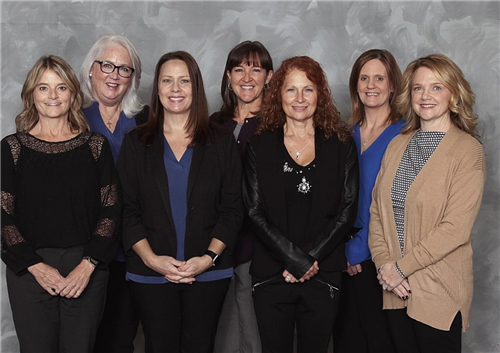Department of Student Services Vision Statement
-
Because every student is a general education student first, our vision of the District 15 Student Services Department is to:
- Address the specific needs of the student by providing intensive support/instruction in reading, writing, and math that are rigorously research-based, instructional best practices, and innovative.
- Build on the individual strengths and needs of each student, taking into consideration the whole child, including: emotional, social, behavioral, health, and academic needs.
- Include all students in the general education environment, grade-level expectations, and grade-level curriculum whenever possible.
Student Services Staff
-

Kelli Catini
Executive Director of Student Services
kcatini@d15.org
Michelle Klosowicz
Assistant Director of Student ServicesMMS, Parkland, Valley View, Riverwood and SES program
Kathryn Stachowiak
Coordinator of Student ServicesEdgebrook, Hilltop, Duker, and Adjusted Learning & SAIL programs
kstachowiak@d15.orgDonna Haage
Coordinator of Early Childhood/Pre-KTiffani Miceli
Administrative Assistant to the Executive Director of Student Services
tmiceli@d15.orgCristy Binz
Administrative Assistant for Early Childhood
cbinz@d15.org
-
Special Education Process
- Step 1: Referral – A referral is a formal request that a child be evaluated for eligibility to receive special education. A school professional or a parent may make a referral if a disability is suspected that affects a child’s ability to perform at school. A referral is typically made after various forms of intervention have been utilized and documented through the Multi-Tiered System of Support (MTSS).
- Step 2: Evaluation – Once a child has been referred for an evaluation and parent consent is given, the school has 60 school days in which the evaluation must be completed. The evaluation is the collection of information from formal and informal assessments of the student, records, observations and interviews. The information obtained through the evaluation will be used to make key educational decisions for the child. A re-evaluation can occur at least every three years.
- Step 3: Eligibility Conference – Upon completion of the evaluation, the parents will meet with a team of qualified professionals to interpret the evaluation data. Parents will be notified of the scheduled time, date, and purpose of the meeting at least 10 days in advance. At the conference, it will be determined if the child has a disability, if the disability is having an adverse impact on the child’s education, and whether special education services are needed.
- Step 4: Individualized Education Program – If the child is eligible for special education services, an Individualized Education Program (IEP) will be developed that will include specific goals and objectives that address the individual child’s strengths and needs. At the IEP meeting, the team will determine the appropriate special education services and educational environment for the child.
- Step 5: Annual Review – The special education team will meet annually to review the current IEP, discuss the child’s progress, and develop new goals and objectives. Although the team will meet at least once per year for an annual review, parents may request a meeting at any time to discuss IEP goals, progress and/or concerns.
-
Individualized Education Program
A child’s Individualized Education Program (IEP) will include:
- Present level of educational performance
- Annual goals
- Progress toward annual goals and how parent(s) will be informed
- Short‐term instructional objectives/benchmarks
- Specific special education, related services, supplementary aids and services, and a statement of program modifications or supports for school personnel
- Beginning date, amount, frequency, location, and anticipated duration of services and modifications
- Extent of participation in regular education programs
- Language(s) or mode(s) of communication
- Participation in assessments
- Placement
- Extended school year services
Additional information may also be provided in the IEP if needed based upon the evaluation results and input from school personnel.
Communication – Having open lines of communication between parents and all members of the special education team is a vital component in the success of the program. The use of email is encouraged for brief questions or sharing of information. Parents can request an IEP meeting or informal meeting at any time to discuss issues and concerns. All questions regarding a child’s special education program should be directed to the case manager. If the case manager cannot answer your question, he/she will help direct you to the appropriate person. Parents will receive progress updates on IEP goals in report cards each trimester.
A qualified interpreter can be provided for parents/guardians at all IEP meetings. District 15 employs 1 certified interpreter, Edna Hernandez, to provide Spanish interpretation for all IEP meetings. All other languages, including ASL, are provided by a professional translation company. If you would like to request an interpreter for your child's meeting, please contact your child's case manager.
-
Educational Environments
Parent consent is required for initial placement in a special education program, and any significant changes in placement would be determined at an IEP meeting. All students will be educated in the least restrictive environment (LRE), meaning that students will be placed in the educational program/setting that is most appropriate to his/her needs and least restrictive of his/her interactions with non‐disabled peers. The following locations may be determined as an educational environment:
- General Education – With this placement, the child will receive specifically designed instruction with supplementary aids and services in the general education classroom.
- Resource – With this placement, the child will receive specifically designed instruction in the resource teacher’s room for a part of the day. The child will be included in the regular education class to the maximum extent appropriate for the remainder of the day.
- Self-Contained Classes/Programs – With this placement, the child will receive specifically designed instruction in a special education classroom. With support, the child is included in the regular education class whenever appropriate.
- Private Therapeutic Day School – With this placement, the child will receive specifically designed instruction in a special school. When the IEP team recommends this placement, funding for tuition and transportation is provided through the school district.

